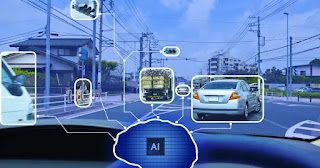Uses of AI technology
Uses of AI Technology
In the contemporary technological landscape, Artificial Intelligence (AI) has emerged as a dynamic and transformative force, influencing diverse sectors with its innovative applications. The uses of AI technology are extensive, ranging from enhancing efficiency in industries to revolutionizing everyday experiences. This note delves into the multifaceted applications of AI, showcasing its versatility and potential impact on various aspects of our lives.
Healthcare:
AI is revolutionizing healthcare through applications such as predictive analytics, personalized medicine, and medical imaging. Machine learning algorithms analyze patient data to predict disease outcomes and assist in the development of personalized treatment plans. In medical imaging, AI enhances diagnostic accuracy by rapidly interpreting complex scans, aiding healthcare professionals in making informed decisions.
Finance:
The financial sector harnesses AI for tasks like fraud detection, risk management, and algorithmic trading. AI algorithms analyze vast datasets in real-time to identify irregularities and potential fraudulent activities. Algorithmic trading systems use AI to analyze market trends, execute trades, and optimize investment portfolios, contributing to more efficient and data-driven financial markets.
Education:
AI technology is reshaping the education landscape by introducing personalized learning experiences. Adaptive learning platforms leverage AI algorithms to tailor educational content based on individual student performance, promoting a more effective and engaging learning environment. Intelligent tutoring systems assist students in understanding complex concepts, providing targeted support.
Manufacturing:
In the manufacturing industry, AI plays a pivotal role in optimizing production processes. AI-driven robotics enhance automation, leading to increased efficiency and precision in manufacturing operations. Predictive maintenance using AI algorithms minimizes equipment downtime by anticipating potential failures, thus improving overall productivity.
Customer Service:
AI-powered chatbots and virtual assistants are revolutionizing customer service. These intelligent systems can handle routine queries, provide instant support, and even engage in natural language conversations. This not only improves customer satisfaction but also allows human customer service agents to focus on more complex issues.
Autonomous Vehicles:
The development of AI technology has spurred advancements in autonomous vehicles. AI algorithms, including computer vision and machine learning, enable self-driving cars to navigate and make decisions in real-time. This technology has the potential to revolutionize transportation by improving safety and efficiency on the roads.
Natural Language Processing (NLP):
NLP, a subfield of AI, focuses on the interaction between computers and human language. AI applications in NLP include language translation, sentiment analysis, and chatbots. Voice-activated assistants like Siri and Alexa showcase the capabilities of NLP in understanding and responding to human language.
Environmental Monitoring:
AI is employed in environmental monitoring for tasks such as analyzing satellite imagery, predicting climate patterns, and managing natural resources. Machine learning algorithms can process vast amounts of data to identify environmental trends, contributing to more effective conservation efforts and sustainable resource management.
Entertainment and Gaming:
AI is enhancing entertainment experiences through personalized content recommendations, virtual reality applications, and AI-driven characters in video games. Recommendation algorithms analyze user preferences to suggest movies, music, and other content, while AI-powered characters adapt their behavior based on player interactions, creating immersive gaming experiences.
In conclusion, the uses of AI technology are vast and continually expanding. From healthcare and finance to education, manufacturing, and beyond, AI is transforming industries and shaping the way we live and work. As technology continues to evolve, the integration of AI is likely to become even more pervasive, opening new possibilities for innovation and advancement in various fields.


.jpeg)







Comments
Post a Comment